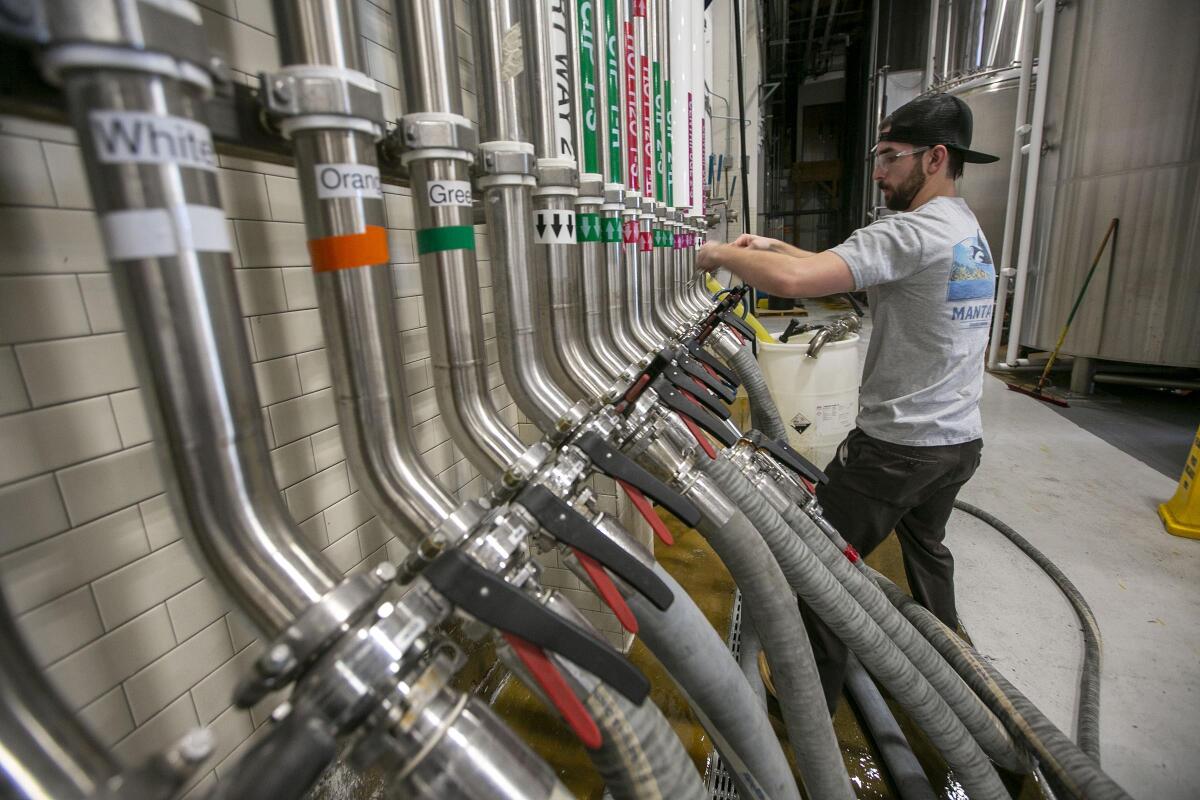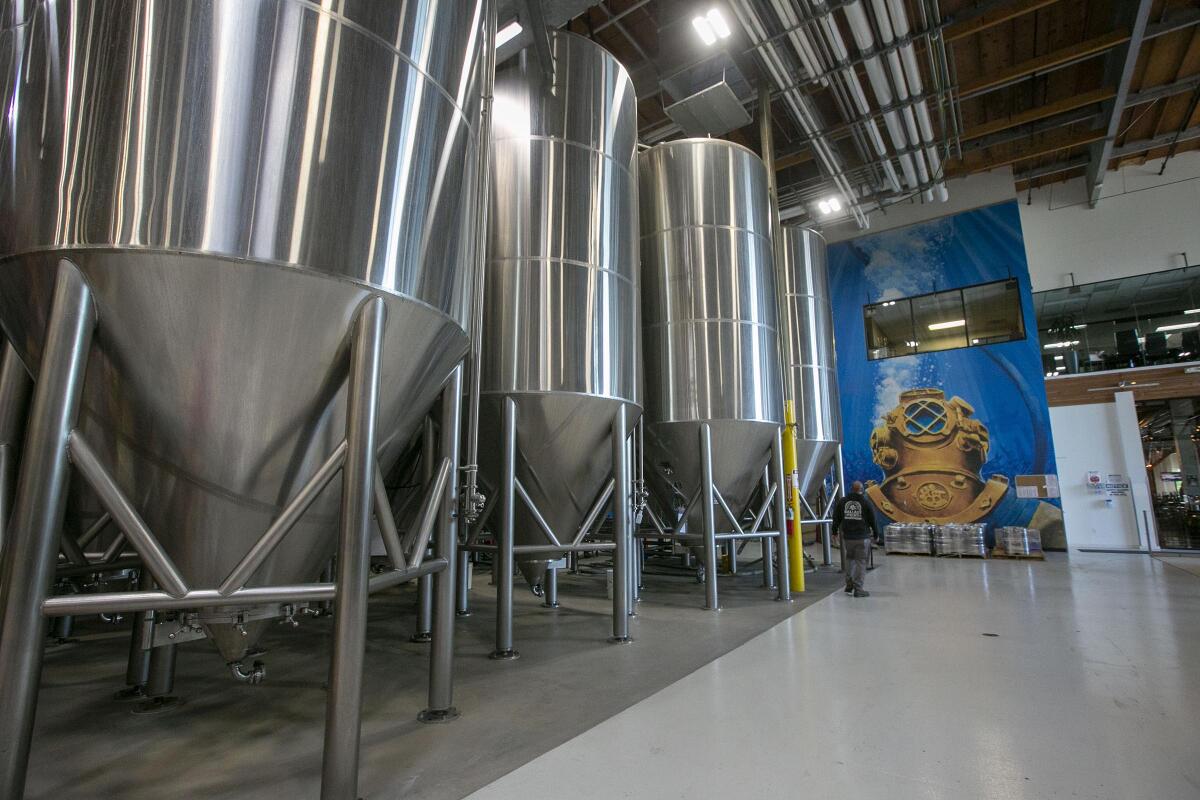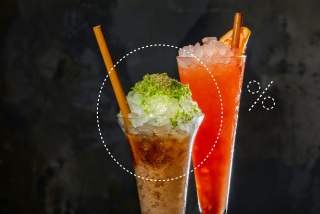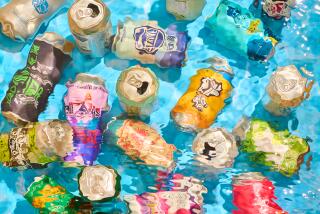Ballast Point’s rise, fall and sale: Inside craft beer’s most baffling deal
Fresh off a family trip to Rome, Chris Bradley sat down with Brendan Watters, his partner at Kings & Convicts, a little Illinois brewery. Anything happen, Bradley asked, during his vacation?
“We’re buying Ballast Point,” Watters said.
“What?” Bradley said. “How?”
That exchange occurred in a Chicago suburb this summer. Similar scenes played out across the U.S. last week, when Constellation Brands — Ballast Point’s current owner — and Kings & Convicts announced the deal. Really? How could an obscure 2-year-old brewery in Highwood, Ill., (2018 production: 550 barrels of beer) land an industry icon (2018 production: 320,000 barrels) once worth $1 billion?
The full answer is cloaked in nondisclosure statements, but a partial explanation involves 9/11, golf and a desperate seller.
New York-based Constellation was eager to dump Ballast Point, with its plummeting sales and a trademark value — a measure of its worth outside of its assets — in free fall, cratering from $223 million in January 2018 to $17 million in October 2019.
“I think they decided it was time to get what they could,” Bart Watson, the Brewers Assn.’s chief economist, said of Constellation, “and focus on their core brands.”
The rise, fall and reinvention of Ballast Point — founded 23 years ago in San Diego — is one of the most dramatic chapters in the annals of American craft beer, illustrating this industry’s much-hyped promise and often overlooked fault lines. The arc of Ballast’s story, from rags to riches to near irrelevance, is a cautionary tale within the industry, while its possible resurgence is a sign of hope for craft beer’s true believers.
Much depends on the savvy of Bradley and Watters, two craft beer rookies and expats — Bradley, the “King,” is from England while Watters, the “Convict,” is from Australia. Having enjoyed financial success in other professions and in other cities, both express confidence in their ability to revive Ballast.
Still, they understand the skeptics. Consider their original plan.
“What we wanted,” Watters said, laughing, “was to have a place to homebrew, put up some TVs and have a place for our friends to gather.”

Not something of Ballast’s size and reputation? “In our wildest dreams,” he said.
What? How?
From calamity to crisis
With his just-us-mates style, Watters appears to be a simple, free and easy Aussie. He’s not.
His resume includes an MBA from the London Business School; a directorship with Avanade, a joint venture of Microsoft and Accenture; 15 years as owner and CEO of a hotel firm, Boomerang, which he sold to the Red Lion group for $8.4 million; and two years as vice president of Le Meridien hotels, overseeing that international chain’s corporate finance, purchases and sales.
He secured that last job on Sept. 10, 2001, with a handshake in a New York City boardroom. The next day, he caught a United flight out of JFK, bound for Seattle, where he lived with his wife and children.
Soon after takeoff, the FAA rerouted his flight to Minneapolis, as authorities grappled with the unfolding calamity of 9/11. “We were one of the last flights to land in the United States that day,” he said.
The 9/11 attacks killed thousands, launched the West’s ongoing war on terrorism and shook global markets. Among the casualties was the travel industry, as flights were canceled and countless people chose to stay home. Watters moved to London to help Le Meridien recover. Flying around the world, he evaluated the chain’s strengths and weaknesses, adding promising hotels and discarding weak links.
“That really taught me the hotel trade,” Watters said.
When his two-year term was up, he founded his own hotelier business, eventually moving to the Chicago area. He led Boomerang through another crisis — the Great Recession — until 2015, when Red Lion made an irresistible offer.
Around that time, he met Bradley. The son of a British foreign service officer, Bradley was a former executive with Navman Wireless, a New Zealand purveyor of consumer GPS devices. He had nodding acquaintance with Watters, due to a personal tragedy.
Lisa and Brendan Watters’ family includes two daughters, a son and a beloved memory. Benny was 5 when he died in 2010, a victim of a rare form of brain cancer. Benny’s World, the charity his parents founded to fund cancer research, held fundraisers that the Bradleys had attended.
The friends’ desire to homebrew led them to a 5,000-square-foot warehouse in Highwood, a town on Lake Michigan’s shoreline 30 miles north of Chicago. The warehouse was too large for a mere amateur operation but sufficient for a small commercial brewery.
They signed the lease in 2016, sold their first pint in 2017, began planning a larger brewery in 2018. They visited about 50 major craft breweries, from Minneapolis’ Surly to Escondido’s Stone. Using this list of best practices, they began building Kings & Convicts’ new home, a 48,000-square-foot production brewery in Pleasant Prairie, Wis., five miles beyond the Illinois border.
Then Bradley took the family to Rome, and Watters took some Constellation executives golfing.
Caught in the middle
Watters has some pull at Conway Farms, a lush course developed by pro golfer Tom Fazio in upscale Lake Forest, Ill. Before hosting the Constellation contingent, he made sure the clubhouse served one of that corporation’s beers, Corona.
After the game, he inquired about Ballast.
Why? the Constellation reps asked.
“I just blurted it out,” Watters said. “We want to buy it.”
A day later, he took a call from Constellation’s Mergers & Acquisitions department.
Constellation made headlines in 2015 by buying Ballast for a reported $1 billion. Crazy money, yes, but at the time it did not seem totally insane.
Ballast had an appealing back story, emerging in 1996 from a homebrewer shop, Home Brew Mart. Its award-winning IPA, Sculpin, was so popular it made cameo appearances on cable TV (HBO’s “Silicon Valley”) and the funny pages (the “Bliss” comic strip). Ballast’s brewers cranked out fan-favorites: Victory at Sea, an imperial porter; Sour Wench, a pioneering American sour; and small-batch experimental brews, the Homework Series.
If Constellation overpaid, many figured, the investment would eventually pay off. The corporation used its marketing muscle to distribute Ballast in 49 states — the lone exception is West Virginia — and touted the brand with billboards and TV ads. An additional fortune was spent on Ballast brewpubs in Long Beach, Anaheim and Chicago plus an East Coast brewery in Daleville, Va.
Sales initially rose, peaking at almost 431,000 barrels (one barrel of beer is 31 gallons).
Then came the collapse. Early estimates for 2019 are somewhere north of 200,000 barrels, while the brand’s trademark value fell by more than 90 percent in less than two years.
Why the decline? Several reasons are cited:
- In San Diego and other craft beer havens, the cognoscenti shunned Ballast, seeing its sale as a betrayal of the brewery’s local, independent roots.
- Constellation bought Ballast just as the explosive growth fueling U.S. craft beer began to slow.
- Craft breweries are now so numerous, there’s been a shift away from bigger brands like Ballast in favor of neighborhood breweries.
“Ballast Point faces the same challenges that a lot of regional breweries face these days,” said the Brewers Assn.’s Watson. “They are caught between hyper-local breweries and the largest brewing companies.”
Constellation was ready to sell. Watters contacted a handful of investors who had backed his previous ventures and banks that had financed those enterprises, then briefed his stunned partner. In a Chicago “war room,” Bradley and Watters spent two weeks poring over Ballast’s books. After consulting with attorneys, financial planners, friends and family, they came to a decision.
“We can take one of the most iconic brands in beer, with a footprint to die for, with brewpubs in fantastic locations, with a beer that we love?” Watters said. “This is awesome.”
On Sept. 12, California’s Secretary of State registered a new company: Kings & Convicts BP LLC.
Boring as bat guano
This deal still needs approval by the federal Alcohol and Tobacco Tax and Trade Bureau. While financial details have not been released, industry observers estimate the sale price between $75 million and $200 million.
Today, Kings & Convicts BP has six partners: Watters and Bradley (20% each); Richard Mahoney, former chief financial officer for the Wine Group, a consortium behind Cupcake, Franzia, Concannon and other wineries (24.9%); and three unnamed individuals, including one commodities trader. Several also have a stake in Kings & Convicts’ Pleasant Prairie expansion.
None, Watters said, owns more than 25% of the company.
That’s important because the Brewers Assn. defines “craft breweries” as those making fewer than 6 million barrels of beer a year; using traditional methods and ingredients; and “independent,” with no more than 25% owned by an outside entity.

The new company will be headquartered in San Diego. While Ballast’s Miramar brewery will devote some time and brew kettle space to Kings & Convicts beers, especially those intended for export to Australia and New Zealand, the partners insisted the emphasis will be on reviving Ballast.
Expect redesigned labels — the current one for Ballast Lager, Watters said, is “boring as bat guano,” or words to that effect — and increased advertising and events in the San Diego and California markets. Bradley promised a revival of the barrel-aged beer program and renewed emphasis on small batches of experimental beers, including some geared toward specific geographic regions.
The partners say Ballast will retain its 49-state footprint, with the focus on a dozen: California, Washington, Colorado, Nevada, Texas, Florida, Massachusetts, New Jersey, New York, Virginia, Illinois and Wisconsin.
Constellation, attempting a more uniform cross-country approach, found itself stuck with a declining brand. Will Kings & Convicts BP suffer a similar fate?
“Even though there’s been decline, Ballast Point is going to sell more than 200,000 barrels this year,” said the Brewers Assn.’s Watson. “In the context of the craft landscape, that’s fairly strong.”
It’s certainly more than 550 barrels.
Rowe writes for the San Diego Union-Tribune.







